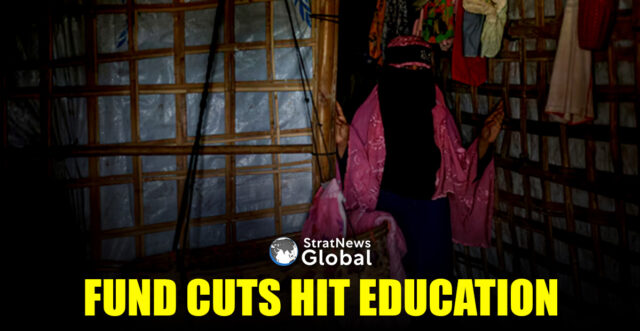Begum, a Rohingya refugee, expressed relief that she married off one of her seven daughters before funding cuts shut down her school and thousands more across Bangladesh’s overcrowded refugee camps, disrupting education for nearly half a million children.
The daughter, Begum’s secondborn, was 16.
“Without school, girls sit idle. People start talking,” said Begum, 35, as her youngest, a toddler, tugged at her headscarf and four other daughters huddled nearby in their bamboo shelter in one of the camps in Cox’s Bazar. “I was afraid. Marriage was the only option. I just pray her husband lets her study.”
Begum, whose husband is struggling with his mental health, declined to give her full name, fearing repercussions for marrying off her daughter at such a young age.
Bangladesh has around 1.2 million Rohingya Muslim refugees, half of them children, most of whom fled a brutal military crackdown in Buddhist-majority Myanmar that U.N. investigators have described as a “textbook example of ethnic cleansing”.
Monday marks the eighth anniversary of that displacement, when more than 700,000 Rohingya crossed into Bangladesh in a matter of days, turning the area into the world’s largest refugee settlement.
Trump’s Foreign Aid Cut
But now, as the United States under President Donald Trump slashes nearly all international aid, and despite a sharp rise in arrivals over the past 18 months, funding for the camps has been cut.
The U.N. refugee agency UNHCR says it needs about $256 million to support the displaced Rohingya this year. The amount is the lowest in six years, but it has only received commitments for about 38% of the total.
Globally, the UNHCR expects to receive just a third of the $10.6 billion it needs this year to assist a growing number of displaced people.
“This community have already lost everything and is now facing a severe funding shortfall that threatens their survival,” said Juliette Murekeyisoni, interim UNHCR Representative in Bangladesh.
“Essential services and lifesaving assistance for the whole Rohingya refugee population are at risk of collapsing: critical food assistance, health services, essential cooking fuel (LPG), soap, and education will either stop or be severely disrupted without urgent additional support.”
UNICEF, which runs many of the Rohingya learning centres, said it suspended operations at more than 4,500 of its schools in June, leaving more than 227,500 Rohingya children without education and nearly 1,200 Bangladeshi teachers without work. Many Rohingya teachers are also without a job.
Classes resumed in July for older students, but many bamboo-and-plastic classrooms remain deserted, doors locked and murals fading in the humidity.
“Now the kids just play in the mud or rain. They’re forgetting everything they once learned,” said Naser Khan, a Rohingya teacher. “Without education, they become blind. A lost generation,” he said.
‘Snatched Away’
In one of the refugee camp’s sweltering lanes, Mohammed Faruq trudges beneath the midday sun, calling out the names of his two young daughters. Once, the girls ran to school with tattered notebooks in hand. Today, they wander aimlessly between the camp’s bamboo shacks.
“Only a little bit of education our children could learn was snatched away,” said Faruq, a father of six who fled Myanmar in 2017. “We survived genocide in Myanmar, we survived floods and fire here — but now our children’s future is being killed silently.”
For Faruq, the crisis feels unbearably personal.
“If our children cannot study, they will have no future … There is no way back to our homeland anytime soon, and here they have nothing,” he said.
Currently, no Rohingya child under the age of 12 in Cox’s Bazar has access to education, according to the International Rescue Committee (IRC), which estimates that as many as 500,000 children are now missing out on learning.
The IRC says the reduction in humanitarian services is already having serious consequences: reported cases of child marriage have risen by 3% this year and child labour by 7% — figures that are probably an underestimate due to limited monitoring and stigma.
“Each day, more families will continue to turn to extreme methods of survival: gambling, selling children into marriage and forced labour, as well as sexual abuse will all rise,” said Hasina Rahman, IRC’s Bangladesh director.
‘Burning Children’s Dreams’
UNICEF says “shifting global priorities” have led to a decrease in contributions.
“To stretch every dollar, we have reduced UNICEF staff, streamlined programmes, and cut costs wherever possible — but the needs far outweigh the resources available,” Rana Flowers, UNICEF Representative to Bangladesh, told Reuters.
The UNHCR warns that the funding crisis threatens to undo years of fragile progress. As violence in Myanmar continues, up to 150,000 Rohingya have arrived in Cox’s Bazar over the past 18 months, adding pressure to already strained services.
“I dreamed my students would become doctors or engineers. Now, with no classes, they will become nothing,” said Kafayat Ullah, a 45-year-old maths teacher. “They burned our homes in Myanmar. Here, they are burning our children’s dreams.”
One of those dreams belongs to nine-year-old Nahima Bibi, who now spends her days playing in the camp’s muddy lanes with the other children. “If I don’t go to school, how will I ever become a doctor?” she said, softly. “My heart feels sad.”
(With inputs from Reuters)





